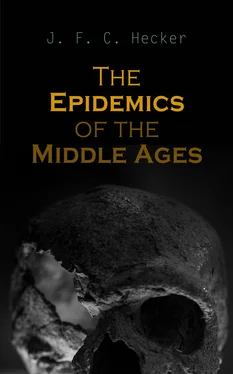PHYSICIANS OF GERMANY.
Table of Contents
It has long been my earnest desire to address my honoured colleagues, especially those with whom I feel myself connected by congeniality of sentiment, in order to impress on them a subject in which science is deeply interested, and which, according to the direct evidence of Nature herself, is one of the most exalted and important that can be submitted to the researches of the learned. I allude to the investigation of Epidemic Diseases, on a scale commensurate with the extent of our exertions in other departments, and worthy of the age in which we live. It is, with justice, required of medical men, since their sole business is with life, that they should regard it in a right point of view. They are expected to have a perception of life, as it exists individually and collectively: in the former, to bear in mind the general system of creation; in the latter, to demonstrate the connexion and signification of the individual phenomena,—to discern the one by the aid of the other, and thus to penetrate, with becoming reverence, into the sanctuary of cosmical and microcosmical science. This expectation is not extravagant, and the truth of the principles which the medical explorer of nature deduces from it, is so obvious, that it seems scarcely possible that any doubts should be entertained on the subject.
Yet we may ask, Has medical science as it exists in our days, with all the splendour which surrounds it, with all the perfection of which it boasts, satisfied this demand? This question we are obliged to answer in the negative.
Let us consider only the doctrine of diseases, which has been cultivated since the commencement of scientific study. It has grown up amid the illumination of knowledge and the gloom of ignorance; it has been nurtured by the storms of centuries; its monuments of ancient and modern times cannot be numbered, and it speaks clearly to the initiated, in the languages of all civilized nations. Yet, hitherto, it has given an account only of individual diseases, so far as the human mind can discern their nature. In this it has succeeded admirably, and its success becomes every year greater and more extensive.
But if we extend our inquiries to the diseases of nations, and of the whole human race, science is mute; as if it were not her province to take cognizance of them, and shows us only an immeasurable and unexplored country, which many suppose to be merely a barren desert, because no one to whose voice they are wont to listen, gives any information respecting it. Small is the number of those who have traversed it; often have they arrested their steps, filled with admiration at striking phenomena; have beheld inexhaustible mines waiting only for the hand of the labourer, and, from contemplating the development of collective organic life, which science nowhere else displays to them on so magnificent a scale, have experienced all the sacred joy of the naturalist to whom a higher source of knowledge has been opened. Yet could they not make themselves heard in the noisy tumult of the markets, and still less answer the innumerable questions directed to them by many, as from one mouth, not indeed to inquire after the truth, but to obtain a confirmation of an anciently received opinion, which originated in the fifth century before our era.
Hence it is, that the doctrine of epidemics, surrounded by the other flourishing branches of medicine, remains alone unfruitful—we might almost say stunted in its growth. For, to the weighty opinions of Hippocrates, to the doctrines of Fracastoro which contain the experience of the much-tried Middle Ages, and lastly to the observations of Sydenham, only trifling and isolated facts have been added. Beyond these facts there exist, even up to the present times, only assumptions, which might, long since, have been reduced to their original nothingness, had that serious spirit of inquiry prevailed which comprehends space and penetrates ages.
No epidemic ever prevailed during which the need of more accurate information was not felt, and during which the wish of the learned was not loudly expressed, to become acquainted with the secret springs of such stupendous engines of destruction. Was the disease of a new character?—the spirit of inquiry was roused among physicians; nor were the most eminent of them ever deficient either in courage or in zeal for investigation. When the glandular plague first made its appearance as an universal epidemic, whilst the more pusillanimous, haunted by visionary fears, shut themselves up in their closets, some physicians at Constantinople, astonished at the phenomenon, opened the boils of the deceased. The like has occurred both in ancient and modern times, not without favourable results for science; nay, more matured views excited an eager desire to become acquainted with similar or still greater visitations among the ancients; but as later ages have always been fond of referring to Grecian antiquity, the learned of those times, from a partial and meagre predilection, were contented with the descriptions of Thucydides, even where nature had revealed, in infinite diversity, the workings of her powers.
These researches, if indeed they deserved that name, were never scientific or comprehensive. They never seized but upon a part, and no sooner had the mortality ceased, than the scarcely awakened zeal relapsed into its former indifference to the interesting phenomena of nature, in the same way as abstemiousness, which had ever been practised during epidemics, only as a constrained virtue, gave place, as soon as the danger was over, to unbridled indulgence. This inconstancy might almost bring to our mind the pious Byzantines who, on the shock of an earthquake, in 529, which appeared as the prognostic of the great epidemic, prostrated themselves before their altars by thousands, and sought to excel each other in Christian self-denial and benevolence; but no sooner did they feel the ground firm beneath their feet, than they again abandoned themselves, without remorse, to all the vices of the metropolis. May I be pardoned for this comparison of scientific zeal with other human excitements? Alas! even this is a virtue which few practise for its own sake, and which, with the multitude, stands quite as much in need as any other, of the incentives of fear and reward.
But we are constrained to acknowledge that among our medical predecessors, these incentives were scarcely ever sufficiently powerful to induce them to leave us circumstantial and scientific accounts of contemporary epidemics, which, nevertheless, have, even in historical times, afflicted, in almost numberless visitations, the whole human race. Still less did it occur to them to take a more exalted stand, whence they could comprehend at one view, these stupendous phenomena of organic collective life, wherein the whole spirit of humanity powerfully and wonderfully moves, and thus regard them as one whole, in which higher laws of nature, uniting together the utmost diversity of individual parts, might be anticipated or perceived.
Here a wide, and almost unfathomable chasm occurs in the science of medicine, which, in this age of mature judgment and multifarious learning, cannot, as formerly, be overlooked. History alone can fill it up; she alone can give to the doctrine of diseases that importance without which its application is limited to occurrences of the moment; whereas the development of the phenomena of life, during extensive periods, is no less a problem of research for the philosopher, who makes the boundless science of nature his study, than the revolutions of the planet on which we move. In this region of inquiry the very stones have a language, and the inscriptions are yet legible which, before the creation of man, were engraved by organic life, in wondrous forms on eternal tablets. Exalted ideas of the monuments of primæval antiquity are here excited, and the forms of the antemundane ways and creations of nature are conjured up from the inmost bosom of the earth, in order to throw their bright beaming light upon the surface of the present.
Читать дальше










